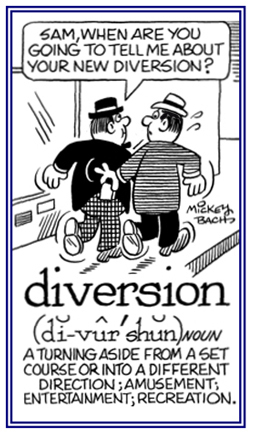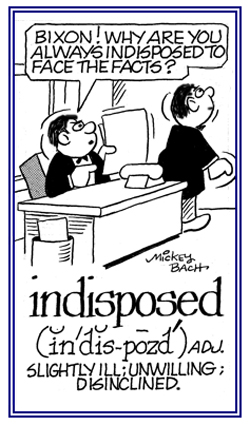dis-, di-, dif-
(Latin: separation, apart, asunder; removal, away, from; negation, deprivation, undoing, reversal, utterly, completely; in different directions)
The meaning of dis- varies with different words; dif-, assimilated form of dis- before f; di-, form of dis- before b, d, g, l, m, n, r, and v.
disturbingly (adverb), more disturbingly, most disturbingly
Descriptive of how something happens or is said in an upsetting manner: Tina altered her expression disturbinglyand was troubled emotionally when she heard of the severe accident her brother was involved in.
The state of separation or lacking agreement.
The breaking of a federation or organized single government: "The national leader rejected the disunionism proposed by the rebellious states."
In U.S. History, a secessionist during the period of the U.S. Civil War.
disunite (verb), disunites; disunited; disuniting
1. To create or to be a source of disagreement between different people or factions within a group.
2. To divide something into smaller parts or groups, or to become divided in this way.
2. To divide something into smaller parts or groups, or to become divided in this way.
Someone who, or that which, disjoins or causes alienations.
A lack of accord or agreements within a group; especially, one caused by a disagreement or a difference of opinion.
disuse
disvirgin
To devirginate.
disyllable, dissyllable (noun); disyllables; dissyllables (pl)
A term containing only two syllables: A few examples of disyllables are "merit", "apex", and "study", and each unit includes vowels and consonants.
1. An action that takes another person's attention away from something else: The rainbow in the sky was a beautiful diversion for the children while their parents were driving on the highway.
2. A change in the purpose or the use of something from what was intended or from what it was previously: While she was baking in the kitchen, Sarah saw a package of chocolate chips that became a welcome diversion of the kind of cookies she was thinking about baking; which was, chocolate chip instead of peanut butter.
3. A change in the direction or the path of something: The rock slide in the mountains caused a diversion of traffic along the nearby highway.
4. An activity or interest that takes a person's mind off more routine or serious things: Jason joined a golf club as a diversion from the pressures of his work at the bank.
5. An action aimed at distracting the attention of others from the place of an intended destination: When the children were playing hide and seek in the park, Elaine tossed a stone into the bushes to create a noisy diversion while she ran to hide behind a park bench.
6. Etymology: from Middle French diversion, from Late Latin diversionem, diversio and from Latin divertere, "in different directions"; blended with devertere, "to turn aside,"; from dis-, "aside" and de-, "from" + vertere, "to turn".

© ALL rights are reserved.
Go to this Word A Day Revisited Index
2. A change in the purpose or the use of something from what was intended or from what it was previously: While she was baking in the kitchen, Sarah saw a package of chocolate chips that became a welcome diversion of the kind of cookies she was thinking about baking; which was, chocolate chip instead of peanut butter.
3. A change in the direction or the path of something: The rock slide in the mountains caused a diversion of traffic along the nearby highway.
4. An activity or interest that takes a person's mind off more routine or serious things: Jason joined a golf club as a diversion from the pressures of his work at the bank.
5. An action aimed at distracting the attention of others from the place of an intended destination: When the children were playing hide and seek in the park, Elaine tossed a stone into the bushes to create a noisy diversion while she ran to hide behind a park bench.
6. Etymology: from Middle French diversion, from Late Latin diversionem, diversio and from Latin divertere, "in different directions"; blended with devertere, "to turn aside,"; from dis-, "aside" and de-, "from" + vertere, "to turn".

Go to this Word A Day Revisited Index
so you can see more of Mickey Bach's cartoons.
divorce
A lack of interest in or being unconcerned about something: Sharon was amazed that the students expressed complete indifference when they heard that their science teacher, Mr. Warren, had to be away for the next two weeks in order to take care of his ailing mother.
indispose (verb), indisposes; indisposed; indisposing
1. To make unwell, unfit for, or not interested in doing something: Mr. Deal, the principal, was indisposed to meet with the parents who were complaining about the school policies.
2. To cause someone to be averse or unwilling to do something: The disorganized results of the revolution were indisposing the people to such a degree that they were no longer willing to support the rebels.
2. To cause someone to be averse or unwilling to do something: The disorganized results of the revolution were indisposing the people to such a degree that they were no longer willing to support the rebels.
indisposed (adjective), more indisposed, most indisposed
1. Descriptive of being slightly ill or not feeling well: Nicole's indisposed sister didn't feel like going to school today.
2. Relating to being unwilling or not likely to do something: The mayor, Mr. Smith, had an indisposed reputation of not admitting that he was involved in drug use until it was proven by a police video.

© ALL rights are reserved.
Go to this Word A Day Revisited Index
2. Relating to being unwilling or not likely to do something: The mayor, Mr. Smith, had an indisposed reputation of not admitting that he was involved in drug use until it was proven by a police video.



